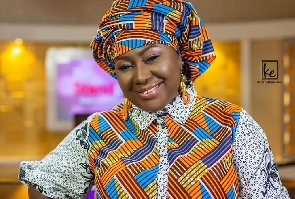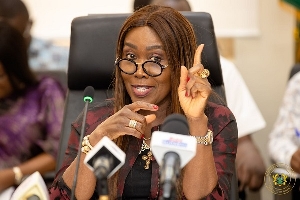Opinions of Monday, 12 April 2004
Columnist: Akosah-Sarpong, Kofi
The Ghanain I.Q. And Development
Food. Culture. Poverty. I.Q. Development.
As Ghanaians (and Africans) increasing open up into the development process these elements have come to constitute their development search, an increasingly vast amalgam in terms of their living well. This situation has also come into the forefront of their thinking unlike yesteryears. As the global good life is mirrored internationally from one corner of the world to another, Ghanaians (and Africans) are increasingly becoming aware about their development process compared to the rest of the world due to boom in global transborder communication network, which has increased migration and development information. Unlike the years past, people are today asking questions about the good life and the future of their generation.
It is in this context that Ghana?s Minister of Food and Agriculture, Major (rtd) Courage Quashigah?s statements about the quality of the Intelligent Quotient (I.Q.) of Ghanaian children call for not only Ghanaian debate but also Africa-wide. Ever since coming to office over three years ago, Quashigah?s statements and observations about Ghana and Africa development process are salient, practical, insightful, and have sparked debates in development circles locally and internationally. Last year, his challenge to African scientists and researchers to tinker with African cultural values for the development process was well received globally, revealing how the Western world and other societies such as the Japanese development process have come about by tinkering with their own values first and borrowing from the outside world to enrich their own.
The importance of Quashigah?s I.Q. statement of the Ghanaian kid resonates in the current situation of not only Ghana but also more especially the entire West Africa, which leads the world as the poorest region. If West Africa is the poorest region in the world, then can we conclude that it has implications with its peoples brains or reasoning or thinking? A painful view but realistic, of which we should not be ashamed to discuss in our development process, especially with global boom in knowledge and the fact that the vast amount of values in the African culture have not being tapped in the continent?s development process. A painful view that needs to be discussed fully in our on-going development process. This is no ethnocentric crap, and even if there is colonialism and its consequent impact, we have not exploited it for our collective advantage as other ex-colonies have done. This is a serious bread-and-butter issue. You eat well, you think well. You eat well, you produce a better generation of people. You eat well, you reason well. You eat well, you solve your problems better. You eat well, you are able to rationalize your problems well without any witchcraft, juju-marabou or demonological crap.
Quashigah says the Ghanaian I.Q. is ?generally reduced due to poor dietary composition of their food coupled with little attention paid to good nutritious diet.? This is unfortunate. We eat the same food throughout the world?the Chinese fried rice is no different from the West African jollof rice. The problem of unavailability of balanced food to a vast number Ghanaians (and Africans) is due to poverty. There are rich food in Ghana and Africa as it is in Canada or Japan. I live in China Town in Ottawa and eat Chinese food a lot. It is not different from my homeland Ghanaian or Sierra Leonean food ? the same vegetables, the tubers, the same meat, the same beans, the rice, the same goat or cow milk, the same celery, the same parsley, the same ginger, the same chilli pepper, the same tomato. The problem is how these land on the table of the average Ghanaian or African with less struggle as it is Canada, and from the table how it help feed the brain for better reasoning or comprehension of problems without attributing problems excessively to unseen forces. It is in this context that Quashigah?s observation that ?Ghanaian parents should not be deceived by the wonders their children could perform on the computers today because they fell short on issues of common sense? should be noted only by parents and guidance but the nation as whole.
If due to poor diet the brain of the Ghanaian is weakened, it means the Ghana becomes weak in addressing its problems ? it doesn?t matter whether there universities or not. More scientifically, it will make Ghanaians use, and with the nature of their culture which is less scientific/objective, the magical or mythopoeic part of their brains more than their objective/scientific part of their brains, and transmit this trait of the brain from one generation to another. Anthropologists call the transmission of such mentality from one generation to another memes - a situation, like genetics and genes, where cultural traits, beliefs and other values are transmitted from generation to generation no matter where the individual or the group from the culture go or live. Most Ghanaians in Toronto, where they are replicating Ghanaian spiritual churches enmass, Malams and other African traditional spiritual practices, still talk about witchcraft and attribute their problems to unseen evil forces, compared with other Canadians, when discussing their problems. An indication of memes.
Said Quashigah, who had part of his military training in Canada and sharpened by his worldly-mindedness, ?Even though there are no statistics in the country to ascertain the I.Q. of this generation, it was obvious that the IQ of our offspring generally has dropped...they see smoke coming out from an electric wire and they will scream Daddy, Mummy come and see. It will not occur to them to switch off the current from the mains?If we as a nation fail to do something about the situation, we would suffer the consequences of an unintelligent generation?What Ghanaians do best as far as eating was concerned was to load themselves with carbohydrates and drink oil on top.? A sad observation with implications for the future of Ghana, a future where the people are so weak that they interpret everything in terms of supernatural powers whereas a Canadian will not, finding rational explanations for their challenges. The revelation is that it is not that Ghanaian scientists and nutritionists had not undertaken a lot of research to produce reports to guide the dietary composition of Ghanaians with proper balanced nutrients, the trouble is that not only had Ghanaians not paid any attention to their diet but are so poor that it makes the dietary research documents impracticable. ?We are, therefore, susceptible to all kinds of avoidable illnesses and deaths that we eventually blame on the elderly described as a witch.? An enlightened statement from an enlightened man. If the witches are so powerful, and can decide life and death, why not give up Ghana?s existence to them so that Ghanaians live in abundant comfort?
The relevance of Quashigah?s statement is that it a build-up on what Prof. Agyemang-Badu Akosa, Director-General of the Ghana Health Services, has observed, an indication that some enlightened Ghanaians are increasing becoming aware of the growing stupidity of our future generation. The seriousness of the I.Q-food issue is how Quashigah and his associates is targeting school-feeding programmes, a development that will save the country from a generation who cannot think about their problems properly and have to rely on juju-marabou mediums, as most of our ?Big Men? have been doing for long time to the detriment of our collective development process. Quashigah?s admonition to his audience to ?brainstorm on the issue to come out with Nutritious Diet Menu for children in schools? reveals that the I.Q.-food issue goes beyond any attempt to demean Ghanaians but find a solution to a serious problem. As a journalist for the past 16 years I have come to be surprised about how most of our Big Men think in relation to our development process. It is, therefore, not surprising to see the entire West Africa as the poorest region in the world. What you see on the ground is what comes from our brains and hearts.
The changing nature of Ghanaians thinking about their development process is reflected by how the state-owned Ghana News Agency (GNA) reported the I.Q., the state of inadequate eating of Ghanaian children and the development process. By seeing prominent Ghanaians of the likes of Dr. Agyemang-Badu Akosa attending the seminar, the indication is that this reflects the increasing open-mindedness of Ghanaian elites towards the future development of their country. Almost fifty years ago, the GNA, and to a large extend the entire Ghanaian media, wouldn?t have reported this type of event for misguided nationalist reasons bordering on ethnocentricism and the fact that outsiders, especially the Europeans, will interpret that we are inferior. The challenge today is for us to think well in relation to our development process in attempting to understand our problems and find durable solutions to solving them.
SOURCE: Mr. Kofi Akosah-Sarpong is an Ottawa-based journalist who concentrates on African development issues, especially its culture.
Email: kasarpon@hotmail.com
Entertainment











